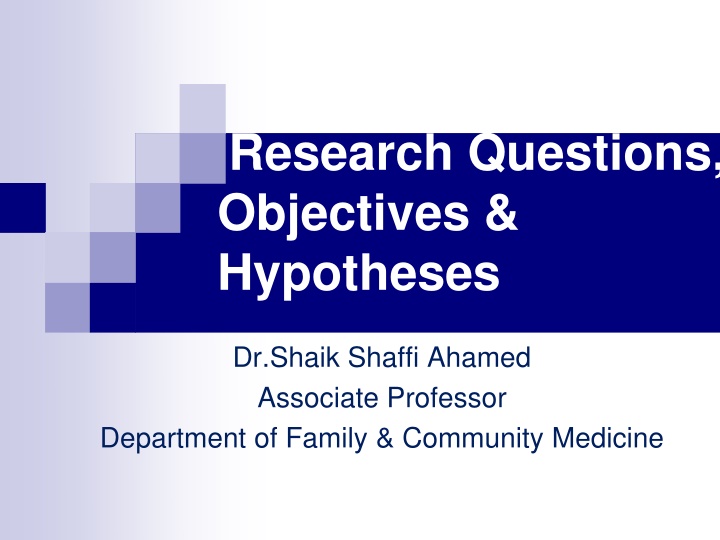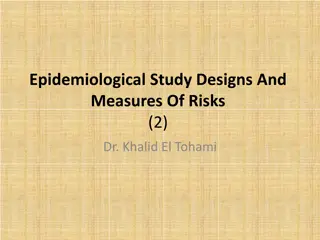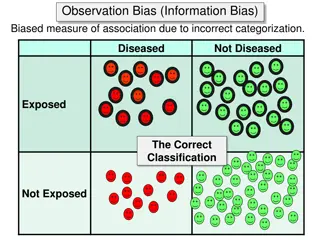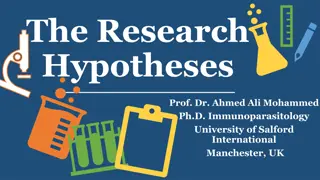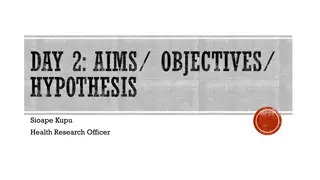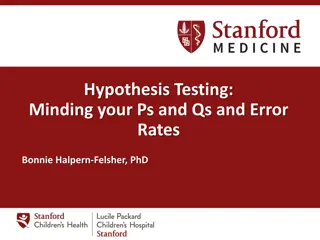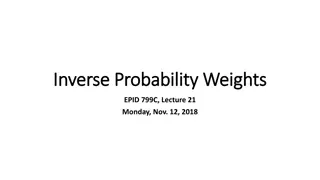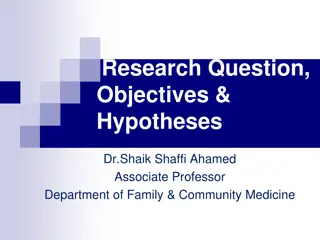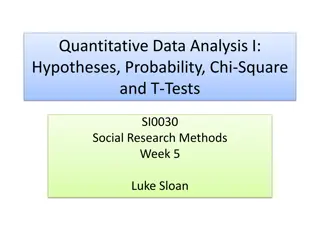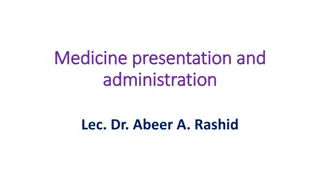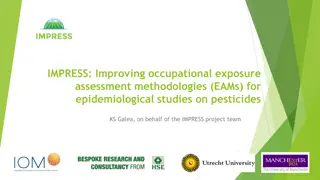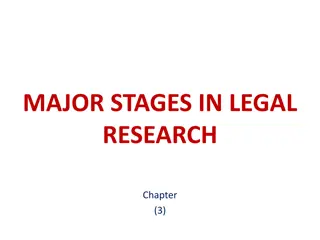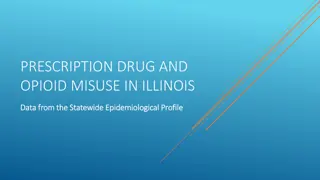Formulation of Research Questions, Objectives, and Hypotheses in Epidemiological Studies
Explore the importance of defining research questions, objectives, and hypotheses in epidemiological research, illustrated through examples from studies on diabetes mellitus in Saudi Arabia. Understand the steps involved in crafting clear objectives and hypotheses to address public health challenges effectively.
Download Presentation

Please find below an Image/Link to download the presentation.
The content on the website is provided AS IS for your information and personal use only. It may not be sold, licensed, or shared on other websites without obtaining consent from the author.If you encounter any issues during the download, it is possible that the publisher has removed the file from their server.
You are allowed to download the files provided on this website for personal or commercial use, subject to the condition that they are used lawfully. All files are the property of their respective owners.
The content on the website is provided AS IS for your information and personal use only. It may not be sold, licensed, or shared on other websites without obtaining consent from the author.
E N D
Presentation Transcript
Research Questions, Objectives & Hypotheses Dr.Shaik Shaffi Ahamed Associate Professor Department of Family & Community Medicine
SESSION OBJECTIVES Students will be able to 1. Learn formulation of research question Differentiate between goals & objectives 3. Define the specific objectives in terms of the stated problem 4. Describe the study hypothesis 2. 2
Ref: Prevalence of diabetes mellitus (DM) in a Saudi community. Ann Saudi Med. 2011 Jan-Feb;31(1):19-23 3
Prevalence of diabetes mellitus by age group in a Saudi community. Ann Saudi Med. 2011 Jan-Feb;31(1):19-23 4
Glycemic control in diabetic patients KKUH January December 2009 Al-Rowais NA Saudi Pharmaceutical Journal (2014) 22, 203-206 % HbA1C < 7% is acceptable as adequate control 5
What research questions come to your mind? Reduction in prevalence of DM? Improvement in well controlled DM? What other research questions can arise ? All the stated responses will lead towards the goal of reducing the impact of DM in Saudi Arabia and each research question will be answered by stating clear objectives 6
Ask following questions initially Do I have the time for this at this point during my course? Is this really the burning topic for me? Will this be worth it? Is this a major and relevant public health problem or is it too esoteric? Are my goals/objectives too big ? Am I covering too much? Will available methods answer my questions? What are the ethical and human subject issues here? 7
Research Question A well-defined and specific research question is the key for making decisions about study design and population and subsequently what type of data will be collected and analyzed. 8
RESEARCH QUESTION IT SHOULD BE A SINGLE SENTENCE IN THE FORM OF A QUESTION. IT SHOULD BE CLEAR UNAMBIGUOUS AND SPECIFIC
How & from where to get ideas to formulate a Research Question ? Be inspired by observing people & practices, by attending seminars, conferences, & symposia Review local, national, and regional problems Discuss, collaborate and get input from your colleagues Read about the topic, reviews, & research done; to find out gaps in existing knowledge? 10
REQUIREMENTS What are the items required to support feasibility of my research question ? Your background knowledge reflects in the question Background information (critical appraisal) stated in intro/background section 11
Subject knowledge Familiarity with the subject helps define an appropriate research question for a study. Questions arise out of a perceived knowledge deficit within a subject area or field of study. (pathways of current knowledge and uncertainty ) The challenge in developing an appropriate research question is in determining which uncertainties could or should be studied and also rationalizing the need for their investigation. 12
Types of Research Questions Descriptive: describing a group, exploring Relational: associations between two variables in a group Comparable: associations between two or more variables in two or more groups (Causality / prediction / intervention) 13
RESEARCH QUESTIONS(examples) What is the level of knowledge of Biostatistics among 3rd year medical students ? Is drug A better than drug B in the management of hepatic failure in patients with Cirrosis? Is alcoholism related to the development of Cirrosis liver?
Relational & Comparable Is concentration of blood cholesterol directly related to dietary intake of saturated fat in Saudi population? (hereditary?/ dietary/ metabolic ? Reasons in Saudi Population could differ from other settings) Does daily saturated fat intake by persons with hypercholesterolemia differ from persons with normal cholesterol range in Saudi population ? (physical activity is in the pathway?) 15
Evaluation of Research Question How good and appropriate is the idea ? Critique appropriateness of your Question Merit of your question Relationship of proposal to problem 16
GOOD RESEARCH QUESTION Feasible: Logical: Novel: Ethical: Relevant: 17
FINER criteria: a good research question F Feasible Adequate number of subjects Adequate technical expertise Affordable in time and money Manageable in scope I Interesting Getting the answer intrigues investigator, peers & community N Novel Confirms, refutes or extends previous findings E Ethical Amenable to a study that institutional review board (IRB) will approve R Relevant To scientific knowledge To future research To clinical and health policy 18
Goals and Objectives Goals Objectives =
Goals It describes the aim of the work in broad terms ( over a longer time period)
Objectives These are more specific and relate directly to research question. They may be divided into two types: Primary objectives (bound to be achieved) Secondary objectives (by the way)
Research Goal & Objectives The goal (aim) and objectives must be stated at the very beginning of the study, since they will guide the investigator during the process of formulating research questions and hypothesis. They will also help in the prioritization process. They will enable the reader or consumer of the work to judge whether the investigator had achieved these objectives or not.
Research Objectives The research objectives should be: Closely related to the research question Covering all aspects of the problem Very specific Ordered in a logical sequence Stated in action verbs that could be evaluated e.g. to describe, to identify, to measure, to compare, etc. Achievable, taking into consideration the available resources and time Mutually exclusive, with no repetitions or overlaps
SMART Objectives S Specific M Measurable A Achievable R Relevant T Time-bound
Research objectives Properly formulated, specific objectives will facilitate the development of your research methodology and will help to orient the collection, analysis, interpretation and utilization of data.
Objective -examples To study whether SNP markers are associated with obesity and hypertension phenotypes. To assess the general population knowledge & attitude towards Organ donation To identify the risk factors for Type-II diabetes
Example Goal: To reduce risk of cardiovascular diseases in Saudi population by developing evidence based interventions Question: Is dietary intake of saturated fats over the past xx weeks related to hypercholestrolemia in Saudi adult population ? Question: Is dietary intake of saturated fats over a period of xx months is associated with risk of coronary heart disease in Saudi adult population 27
Example contd. Specific Objective1: To determine the daily intake of saturated fats in the past 4 weeks in Saudi adults Specific Objective 2: To determine the relationship of dietary intake of saturated fats and blood levels of low density lipoprotein (LDL) in Saudi adults Specific Objective3: To determine the association of dietary intake of saturated fats and intimal thickness of coronary artery in Saudi adults 28
Research Hypothesis Research hypothesis is a statement of the research question in a measurable form
Research Hypothesis (cont.) A hypothesis can be defined as a prediction or explanation of the relationship between one or more independent variables (PREDISPOSING/RISK FACTORS) and one dependent variable (OUTCOME/CONDITION/DISEASE)). A hypothesis, in other words, translates the problem statement into a precise, clear prediction of expected outcomes. It must be emphasized that hypotheses are not meant to be haphazard guesses, but should reflect the depth of knowledge, imagination and experience of the investigator.
Hypothesis formulation This is based on existing knowledge, deriving it through critical reading of literature and facts Descriptive: It is hypothesized that average daily intake of saturated fat in Saudi adult population is more than 20% of the recommended intake when measured by xxx test and yyy standards to define dietary saturated fat intake. 31
Hypothesis formulation Specific Objective: To determine the relationship of dietary intake of saturated fats and intimal thickness of coronary artery Hypothesis It is hypothesized that > 20% of recommended saturated fat intake in Saudi population will be associated with 50% increased intimal thickness of coronary artery when compared to the normal intimal thickness measured by XYZ 32
Hypothesis-examples We hypothesize that standard care plus new intervention (additional drug) will be superior to standard care alone in reducing CVD mortality among patients with preexisting heart disease. We hypothesize that prophylaxis with inhaled drug A will be superior to oral preparation of drug B in preventing acute exacerbation of reactive airway disease. We hypothesize that low birth weight is an independent risk factor for type II diabetes.
Example 1: (KAP Study) Area: Family medicine Topic: communicable diseases- hepatitis Goal: to contribute to the reduction of hepatitis in KSA through studying public perceptions about the disease Objective: To assess the awareness, knowledge, and attitudes of the general public towards hepatitis in KSA. Hypothesis: It is hypothesized that the awareness, knowledge and attitudes of the general public towards hepatitis in KSA is less than 50%.
Example 2: (Interventional Study) Research area: cardiology Research topic: ischemic heart disease (IHD) Goal: to contribute to prevention of IHD Research question: does hypocholesterolemic agent A decrease the risk of MI? Primary objective: to determine the effect of reducing LDL on the occurrence of MI Secondary objective: to describe the side effects of lowering LDL Research hypothesis: the risk of MI among patients treated with hypocholesterolemic agent A is lower than the risk among patients not treated with hypocholesterolemic agents
Summary Perform a systematic literature review to increase knowledge for the topic 1. Learn about current trends and technological advances on the topic. 2. Seek careful input from experts, mentors, colleagues and collaborators 3. Use the FINER criteria in the development of the research question. 4. Develop clear and well-defined objectives using SMART criteria 5. Ensure that the research question and objectives are answerable, feasible and relevant. 6. Develop the testable research hypotheses from the research question. 7. 36
References References Stephen B Hulley. Designing Clinical Research. 3rd Edition . Wolters Kluwer Health Lippincott Williams and Wilkins 2007 Daniel P Schuster & William J Powers. Translational and Experimental Clinical Research. Introduction: Lippincott Williams and Wilkins 2005 37
